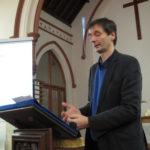By Martin Whitlock, Stop-GDP.org
People from Totnes and the surrounding community gathered in the Methodist Church, on Thursday (4th February 2016), to hear Professor Lorenzo Fioramonti, a global thought leader in the “Beyond GDP” movement and author of Gross Domestic Problem: The Politics Behind the World’s Most Powerful Number, discuss the “wellbeing economy”, and explain how using GDP as a measurement prevents the economy from working in the interests of human and environmental wellbeing.
In his talk – hosted by the Network of Wellbeing (NOW) and the Totnes REconomy project – Professor Fioramonti provided a comprehensive critique of GDP as a measure of progress. He reviewed its history, its many inconsistencies and the behavioural distortions that it produces, as well as its contribution to inequality, social injustice, ill-health, environmental destruction and resource depletion. He explained how outcomes could change in a society that measures its success in a different way. The wellbeing economy is not just an intellectual construct, he argued, but a framework for growing the resilient, productive, sustainable communities upon which the future depends.
The question was asked, “But what can we actually do?” The answer, we were told, lies in political action. If people come to understand that changing the way the economy is measured and described will change the way that it operates, the need for reform will start to enter the mainstream democratic process.
That’s all very well, people said, but the democratic deficit in top-down government makes it hard to get one’s voice heard. The town council has hardly any power. Local authorities function like commercial service-providers, outsourcing everything they can, and are increasingly beholden to the interests of big business. As for influencing central government – forget it. True democracy exists in the power of the community to take action for itself.
This is a crucial point. Actually doing things in a better way has the edge over talking about doing so. The hosts for Thursday’s talk were both Totnes-based groups committed to growing practical local solutions to the problems of inequality, social injustice, ill-health, environmental destruction and resource depletion – exactly the issues that the Beyond-GDP agenda is seeking to address.
Totnes is also the birthplace of the Transition movement and home to a multitude of initiatives engaged in sharing, recycling, exchanging, growing, making and mending on a sustainable, local scale. The Totnes Pound is a powerful symbol of the area’s determination to re-envision the money economy in a way that serves those initiatives, to focus on keeping things local and small-scale, to remove wastefulness from the cycle of consumption and to place wellbeing-related outcomes at the heart of everything that the community undertakes.
In a real sense, therefore, much economic activity in Totnes has already gone “Beyond GDP”, either in fact or in aspiration. GDP measures money turnover and transactions, but nobody working in the sharing, recycling and exchanging community is interested in those things. Money has its uses, but the economics of gifting, sharing and exchanging can be much more efficient than the money economy, provided the networks and relationships are there to support them.
So the question is: if a sharing economy is so much more efficient, how come the economic system makes it so hard? The answer is that most people who participate in the sharing economy are obliged to do it in their spare time. Few can afford to opt out of the less efficient, more costly, money economy, which continues to provide many of the things (including housing) that they need.
It is hard to live in a sharing economy when its true value is not accepted by the money system. If it were, people could be paid for things like growing their own food. Much of the price paid for food in a supermarket is the cost of the supply chain. People growing their own food are saving society that cost and should be rewarded for doing so.
Looked at like this, the many initiatives in the wellbeing economy that Totnes has pioneered should not be thought of as opting out of the money system so much as challenging that system to change its ways. And that is why the argument against GDP is so important. Trying to grow wellbeing in a system designed for growing money really is hard. But it could get easier if, while trying to live in the spirit of the new economy, we campaign to change the old system, too.
Martin Whitlock is co-founder of Stop-GDP.org. He is the author of Human Politics : Human Value, a detailed critique of the GDP economy and the political, social and economic harms that it causes.

